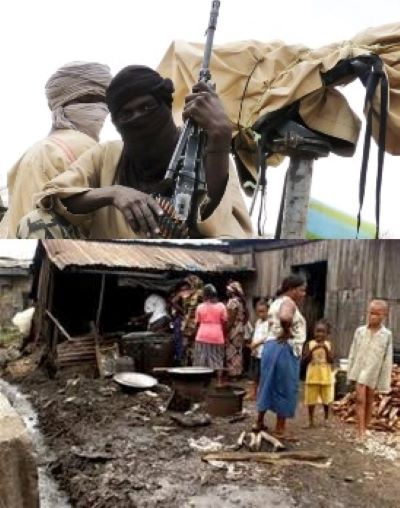Some security stakeholders said on Thursday, that addressing poverty and bad governance were key to curbing insecurity currently ravaging the Sahel region.
The experts stated this in Abuja, during a public debate on “Security in the Sahel: Effects, Challenges, Strategies and the Way Forward”, organised by West Africa Democracy Radio (WARD), Dakar, Senegal.
They described poverty and bad governance as the root cause of insecurity in the Sahel.
The Sahel stretches from the Atlantic Ocean eastward through northern Senegal, southern Mauritania, the great bend of the Niger River in Mali, Burkina Faso, southern Niger, northeastern Nigeria, south-central Chad, and into Sudan.
Mr Gad Peters, Executive Director, CLEEN Foundation, particularly said that insecurity thrived because governments have failed to provide the needs of the people to enable them to live a life of dignity.
Peters spoke on the topic, “Regional and International Responses to Security: The Role of International Organisations in Addressing Global Security Challenges”.
He said that addressing poverty was principal to addressing insecurity in the Sahel.
He also called for a functional education to equip the region’s population with life sustaining skills.
Peters argued that the over dependence of African countries on international donor organisations was depriving the countries from looking for workable local solutions.
He added that development partners’ support was usually not for the sake of humanity but to satisfy certain economic interests.
“Insecurity in the Sahel will reduce significantly if the economy works for the common man.
“There is also the need to address poverty, unemployment, and build community resilience to shocks caused by poverty and deprivations,” he said.
On his part, Dr Peter Olumuji, Urban Security Strategist, while noting the contribution of poverty and bad governance to rising insecurity, stressed the importance of co-opting traditional and religious leaders into Africa’s security architecture.
Olumuji, who is also the Secretary, Command and Control Centre, FCT Administration, stressed the need to develop the capacity of traditional and religious leaders on security.
He described the traditional and religious institutions as critical to maintaining security at community level.
“Let us localise our security solutions to achieve the desired results,” he said.
Similarly, Dr Emmanuel Ojukwu, former Commissioner of Police, also stressed the need to involve women in driving solutions to insecurity in the Sahel and the African continent.
According to him, women bear the brunt of insecurity anywhere in the word and their participation will help in reaching a workable solution to rising insecurity in the region.
“Also, people need to be provided with the right information about government efforts and the traditional and religious leaders play a critical role in this regard,” he said.
For Mr Austin Aigbe of the West Africa Democratic Solidarity Network, leadership selection process plays a key role in fuelling insecurity in the Sahel region.
According to him, bad governance thrives because of deficit electoral processes in Africa, which in the long run severed trust between the government and the governed.
“The people need to trust the government enough to provide intelligence reports to security operatives and bad governance would continue until we correct the anomalies in our electoral process.”
Earlier, Mrs Agnes Thomasi, Station Manager, WADR, explained that the debate was part of activities under the project, “Providing Quality and Relevant Information: A Counter Narrative on the Security Situation in the Sahel.”
Thomasi said that the debate was the second phase of the WADR project, under Open Society Foundation (OSF), an Africa’s Security and Rights project, designed to contribute to the process of peace building in Africa.
The News Agency of Nigeria (NAN) reports that West Africa Democracy Radio (WADR) is a trans-territorial, sub-regional radio station based in Dakar, Senegal.
It was established by the Open Society Initiative for West Africa now Open Society Africa in 2005 to defend the ideals of democracy and open society, by dissemination of development information across the West African sub-region. (NAN)


